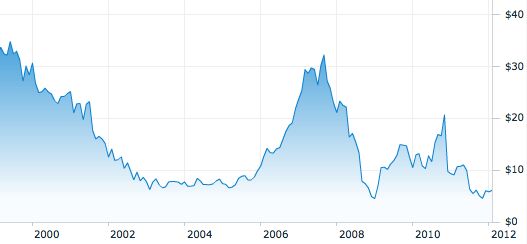Italy Seizes Gaddafi's Stake In Fiat
A year ago nearly to the day, I was investigating the connection between Libyan dictator Muammar Gaddafi and Fiat. With an American-led intervention in Libya underway, Reuters had reported that a Wikileaked State Department document revealed that the Libyan Government owned a two-percent stake in the automaker Fiat as recently as 2006. When I contacted Fiat’s international media relations department for comment, I received this response:
Dear Mr Niedermeyer,
Further to your email, I would mention that the Reuters report you refer to is incorrect. As too are other similar mentions that have appeared recently in the media concerning the LIA’s holdings in Fiat.
The LIA sold all of its 14% shareholding in Fiat SpA in 1986 – ten years after its initial stake was bought. It no longer has a stake in Fiat SpA.
I trust that this clarifies the matter.
It didn’t, actually. In fact the matter remained as clear as mud to me until just now, when I saw Reuters’ report that Italian police have seized $1.46 billion worth of Gaddafi assets, including “stakes in… carmaker Fiat,” under orders from the International Criminal Court.
So, did Fiat lie? Not exactly. The Libya Arab Foreign Bank did sell back its shares in 1986, but the Wikileaked memo claimed that a successor entity, the Libyan Arab Foreign Investment Company, was the more recent Libyan investor. Not being well-versed in the structure and history of Libya’s sanction-avoiding foreign investment shell companies, and lacking the resources to effectively pursue the story ( tracking Gaddafi-era investments is a chore), I left it there. And even now that Italian police confirm that a Gaddafi-controlled stake in Fiat has been seized, it’s not at all clear whether Fiat’s management was aware of this.
The AGI has the most detailed account, reporting
The Guardia di Finanza Corps of Rome has seized property worth more than 1.1 bln euro from members of the Ghaddafi family upon a warrant of the International Criminal Court of The Hague. The property seized includes real estate, company shares and bank accounts that belong to members of the Ghaddafi family or to people of Ghaddafi’s entourage with an overall value of more than 1.1 bln euro
Property investigations carried out by the GdF of Via dell’Olmata, in Rome have enabled to discover two financing companies through which leaders of the former Libyan regime had made investments in Italy. [emphasis added]
That covers Fiat management fairly well: at the very least, it appears that they didn’t know about Libyan investment until police were involved. I might suspect that this very Gaddafi stake in Fiat was frozen by Italian authorities prior to my request for comment, and Fiat’s representative misled me about it… but I have no way of proving it. Time will (hopefully) tell.
Meanwhile, on this side of the pond, it’s only a little strange that this wasn’t somehow brought to light in pre-bailout vetting of Fiat. Sure, a foreign enemy of the United States was a significant shareholder in the firm that was handed a bailed-out Chrysler for no cash down. On the other hand, Libya was not on the War On Terror radar at the time, and the auto task force had enough to worry about without investigating Fiat’s shareholders. All the same, chalk this up as yet another example of the unintended consequences of government intervention in the economy.
Finally, there’s the real question: did Gaddafi actually benefit from his Fiat investment? It all depends on when this second investment in Fiat shares took place. The Wikileaked memo says Libya owned two percent of Fiat as of 2006, which means it was enjoying the short-lived Marchionne boom ( financed in part by General Motors) after years of decline and stagnation. And when things headed south in 2008, snagging Chrysler for nothing sent Fiat stock on its last real bounce… which means the Gaddafi regime did benefit to some extent from the auto bailout. Still, with Fiat’s shares pricing at all-time lows the Libyan dictator almost certainly lost money on his Fiat investment over the years. Unless the Guardia di Finanza find evidence that Fiat’s management knew about Libyan investment, this might well be a case of “no harm no foul.”
More by Edward Niedermeyer
Latest Car Reviews
Read moreLatest Product Reviews
Read moreRecent Comments
- SCE to AUX All that lift makes for an easy rollover of your $70k truck.
- SCE to AUX My son cross-shopped the RAV4 and Model Y, then bought the Y. To their surprise, they hated the RAV4.
- SCE to AUX I'm already driving the cheap EV (19 Ioniq EV).$30k MSRP in late 2018, $23k after subsidy at lease (no tax hassle)$549/year insurance$40 in electricity to drive 1000 miles/month66k miles, no range lossAffordable 16" tiresVirtually no maintenance expensesHyundai (for example) has dramatically cut prices on their EVs, so you can get a 361-mile Ioniq 6 in the high 30s right now.But ask me if I'd go to the Subaru brand if one was affordable, and the answer is no.
- David Murilee Martin, These Toyota Vans were absolute garbage. As the labor even basic service cost 400% as much as servicing a VW Vanagon or American minivan. A skilled Toyota tech would take about 2.5 hours just to change the air cleaner. Also they also broke often, as they overheated and warped the engine and boiled the automatic transmission...
- Marcr My wife and I mostly work from home (or use public transit), the kid is grown, and we no longer do road trips of more than 150 miles or so. Our one car mostly gets used for local errands and the occasional airport pickup. The first non-Tesla, non-Mini, non-Fiat, non-Kia/Hyundai, non-GM (I do have my biases) small fun-to-drive hatchback EV with 200+ mile range, instrument display behind the wheel where it belongs and actual knobs for oft-used functions for under $35K will get our money. What we really want is a proper 21st century equivalent of the original Honda Civic. The Volvo EX30 is close and may end up being the compromise choice.


































Comments
Join the conversation
Well, E.D., you've been vindicated. Good job.
"With an American-led intervention in Libya underway" Replace 'American' with French and UK...there's a good chap...